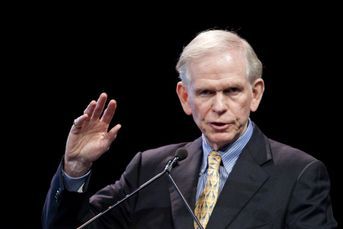Calling on Bond, James Bond, to make the case for bond alternatives
“By and large the bond market is over. Maybe you want to put some James Bond in your portfolio,” a top strategist said at the IMCA conference.
Making the case for alternatives to bonds, Jeffrey Kleintop, LPL Financial’s chief market strategist called on British secret agent James Bond.
“There’s just no value in the bond market,” he told an audience at the Investment Management Consultants Association’s annual meeting in Boston. “By and large the bond market is over. Maybe you want to put some James Bond in your portfolio.”
He said that this year is the 50th anniversary of the release of the Bond film “Goldfinger” and said his favorite character in the film series is Q, the chief of the British Secret Service’s research and development division.
As Q created gadgets such as a passenger ejection seat in Bond’s famous Aston Martin DB5, which helped make 007 safer, investors might consider some assets that could make their portfolios safer, such as bank loans, real estate investment trusts, master limited partnerships and business development companies.
Mr. Kleintop said that while these investments are riskier than bonds, they can provide solid returns that are not correlated to equities.
Bank loans offer “credit without the duration risk” of bonds, he said, adding that the asset class is becoming increasingly attractive.
Benjamin Pace, chief investment officer at Deutsche Wealth Management in the Americas, said since most banks in the U.S. have fully repaired their balance sheets after the financial crisis, the supply of bank loans is improving.
As for stocks, indicators ranging from interest rates to politics to the economy suggest that prices have plenty of upside room this year, the strategists said.
Pointing out that bull markets in 2000 and 2007 ended when the yield curve was inverted, which is not the case today, Mr. Kleintop said the end of the current bull market is still some time away.
In addition, capital spending is beginning to pick up and the prospects of a lame-duck Congress after this fall’s election suggests companies will continue to spend, he said. Those two factors also point to rising stock prices.
“It does look like the Republicans have a pretty good chance of taking the Senate and then we’ll very much have a lame-duck Congress,” Mr. Kleintop said. “Pretty much nothing is going to get done.”
That inertia will encourage business owners and managers to spend the cash they’ve built up on their balance sheets on more than stock buybacks.
“Last year was about the consumer and this year is about business,” Mr. Kleintop said.
Jeffrey Knight, head of global asset allocation at Columbia Management, said a lame-duck Congress would provide a bullish window but that overall, he is focusing outside the U.S.
“The regulatory, tax and litigation environment [in the U.S.] is troublesome,” he said, adding that three issues could constrain the economy for the next several months.
First, the weather in the first quarter, while the least important worry, probably delayed some spending. Second, the adjustment in interest rates last year continues to hamper the housing industry, and third, businesses have inventory to work off after ramping up production ahead of demand last year, Mr. Knight said.
“The next couple of quarters could be frustratingly sluggish,” he said, adding that normal rates of economic growth are likely in 12 to 18 months.
Mr. Pace said he has been recommending that clients pull some assets out of emerging markets and return them to the U.S.
“We’re seeing a return to normalcy in the U.S.,” he said, citing historical rates of economic growth. “The emerging markets economies are slowing down.”
As such, he said he is recommending that clients stick to developed market stocks over emerging markets.
But Mr. Knight said investors could still find value in emerging markets.
“I wouldn’t underweight emerging markets anymore,” Mr. Knight said. “They stand out as a cheap asset class. They just need a catalyst.”
He added that identifying that catalyst is difficult but still, emerging markets equities should perform well this year.
Mr. Kleintop said he is most attracted to emerging markets in Asia such as the Philippines and Indonesia.
Learn more about reprints and licensing for this article.








